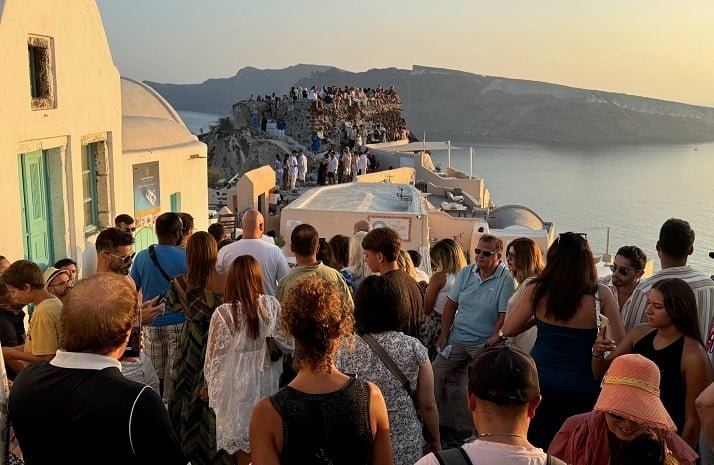
Despite a significant surge in tourist arrivals, Greece’s tourism sector faces a critical challenge: revenue growth is not keeping pace. A recent Eurobank study reveals a concerning trend of visitors staying for shorter periods and spending less, raising serious questions about the long-term sustainability of Greek tourism.
The study, titled “Tourism Pillar: Key Characteristics, Economic Impact, Challenges, Opportunities, and Policy Proposals,” highlights a paradigm shift: more tourists, but with a diminished economic footprint per visitor.
This shift is attributed to evolving traveler preferences and increasing pressures on the environment and service quality, which could jeopardize future growth.
Eurobank’s analysis points to a clear solution: bolster the sector’s economic contribution by increasing revenue per visitor, rather than simply chasing higher arrival numbers.
This strategy hinges on safeguarding the authenticity of the tourist experience, which is intrinsically linked to the preservation of cultural heritage, environmental protection, and the beauty of natural landscapes. These vital elements are often incompatible with a model of low-cost, mass tourism.
The study advocates for a strategic plan for public and private tourism infrastructure development that prioritizes sustainability and fosters symbiotic relationships with other economic activities, moving away from a purely competitive approach.
Furthermore, tourism services must adapt to evolving global trends across social, economic, geopolitical, and technological spheres, as well as the new realities of climate change, to continuously enhance the traveler’s experience.
Statistical snapshot of Greece’s tourism landscape
The Eurobank data for the period 2011-2024, which encompasses the pandemic, post-pandemic recovery, energy crisis, and geopolitical tensions, illustrates this dynamic:
Revenue Recovery, but Below Pre-Pandemic Levels (in real terms): After a sharp contraction to €4.3 billion (2.6% of GDP) in 2020, travel receipts rebounded to €21.6 billion (9.1% of GDP) in 2024. However, as a percentage of GDP, they did not surpass pre-pandemic levels. In real terms (at constant prices), the absolute size of receipts in 2024 was 1.6% lower than in 2019, despite an 18.8% nominal increase.
Arrivals Soar, Spending Per Visitor Plummets: The average annual growth in travel receipts (5.8%) from 2011 to 2024 was primarily driven by a surge in arrivals. Inbound travel traffic reached an impressive 40.7 million travelers in 2024 (including cruise arrivals), up from 15 million in 2010 – an average annual increase of 7.1%.
In stark contrast, the average expenditure per traveler significantly decreased to €530.6 in 2024, down from €640.4 in 2010. This decline directly reflects the reduction in the average length of stay, which dropped from 9.3 nights in 2010 to just 5.9 nights in 2024. Factoring in an average annual inflation of 1.9% in the restaurants and hotels category, the real average annual change of expenditure per overnight stay was 0% (and -3.2% for average total expenditure per traveler) from 2011-2024.
This data underscores the urgent need for Greece to pivot its tourism strategy from a volume-driven model to one that prioritizes value, ensuring a more resilient, economically robust, and environmentally responsible future for the sector.
Will 2026 see a drop in Greece’s tourism revenue?
Giannis Retsos, president of Foundation for Economic & Industrial Research (IOBE), cautioned that 2026 may see Greece’s tourism revenue drop for the first time in years, excluding the COVID period.
Speaking recently at IOBE’s quarterly economic report presentation, he noted that after nearly a decade of growth, Greek tourism may have peaked, facing fierce competition, particularly in the Mediterranean. “Destinations that are better prepared will lead the way,” he said, noting that matching 2025’s revenue in 2026 would be a success.
He pointed on two key issues: Reduced spending power in major European markets due to income pressures and the negative U.S. market sentiment, driven by Trump-era politics and regional geopolitical tensions.
Related: Tourism Alone Won’t Save Greece: Why a Complex Economy Is Urgently Needed


